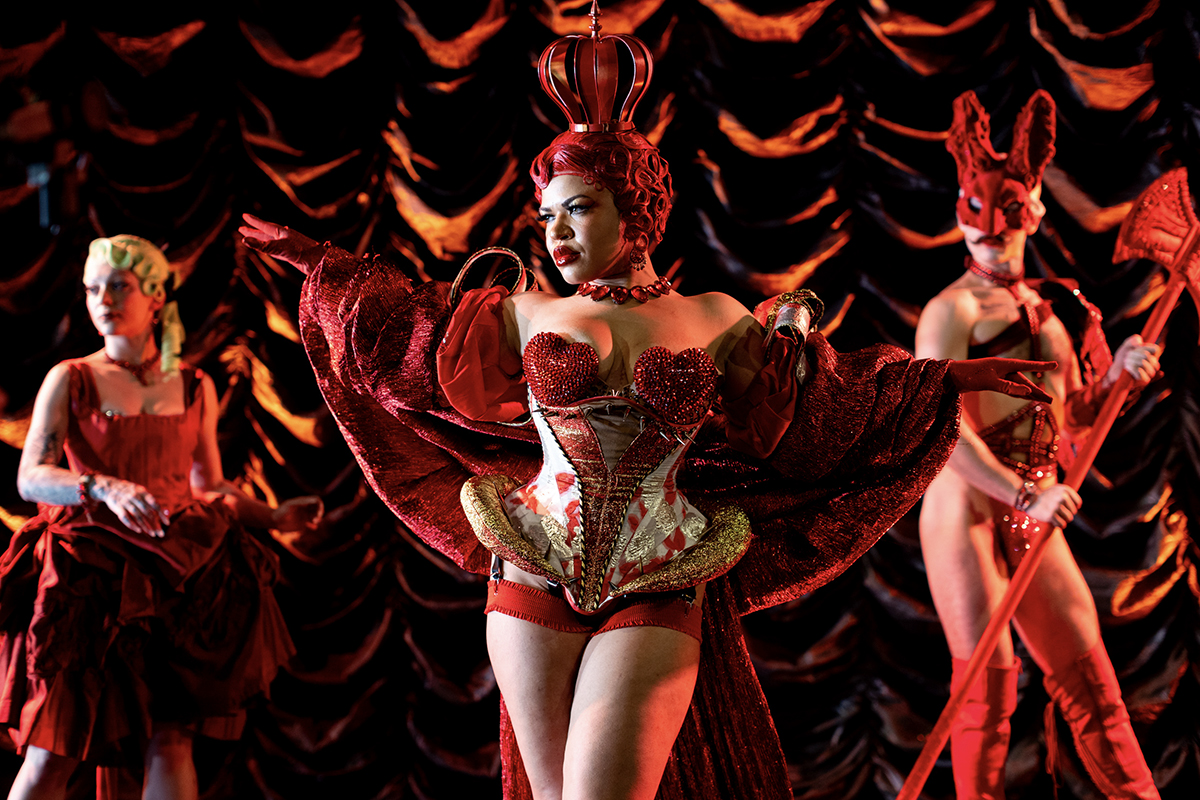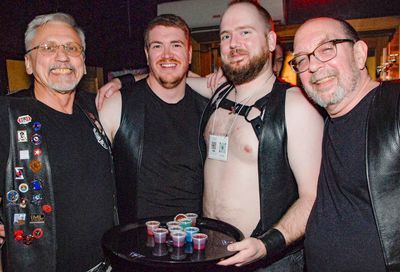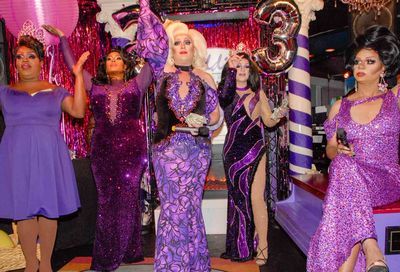Marching to a Different Tuna
Sears and Williams embrace Southern, small-town eccentricity with an all-American trilogy
There are plenty of tuna recipes. You can grill it, throw it into a salade niçoise, or marry it straight from the can with mayo and relish for pure Americana. But if you want to turn tuna into an institution, you’ll need equal parts Joe Sears and Jaston Williams. Welcome to Tuna, Texas.
In the early ’80s, Sears and Williams, along with Ed Howard, crafted the first skit set in Tuna, the fictional third-smallest town in Texas. This Austin staging proved a hit. Since then, the trio has written three complete plays for the Tuna trilogy: Greater Tuna, A Tuna Christmas, and Red, White & Tuna. Throughout, Sears and Williams have played all 20-some characters that populate the tiny town as they’ve toured the shows across the country for roughly a quarter of a century. They’ve even played two command performances at the White House, during the first Bush administration.
”I have to say that the Bush family has been extremely open to liberal Democrats, which we are,” says Williams, commenting on his performances at the White House. ”I think it says something for America and Texas that people that you totally disagree with in terms of public policy will want to come see your show.
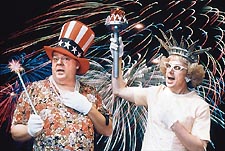 |
”I used to run into Laura [Bush] at the post office in Austin,” he continues. “She was a very down-home, very relaxed individual, and I admired that in her. Barbara Bush was always very generous and kind to us, very gracious to us.
”That’s one thing I’ve always felt about the Bush men — regardless of their politics, they’ve got good taste in wives.”
And Williams knows women. So does Sears. At least, they have the unique insight that comes from lovingly playing the dozen or so women who are the heart and soul of Tuna. In the forefront are Williams’s Vera Carp and Sears’s Aunt Pearl Burras. While Vera runs the Prayer Posse and the Smut Snatchers, acting as the town’s font of moral indignation, Aunt Pearl is the cool-headed matron who is little fazed by society’s changing mores.
”Somebody told [Vera] that her sister was a lesbian,” Williams says of Vera Carp, stopping time with her cat-eye lenses and pillbox hats. ”She said, ‘No, she’s not. She’s a Baptist and she always has been.”’
Sears says the elder Aunt Pearl, looking as though she stepped out of the Depression, may have a better grasp what it means to be gay, though not by much.
”She’s been happy all her life — she’s very gay,” says Sears. ”She doesn’t hold that against anybody. But she did try it once when she was a young woman. They just got the giggles and got up and made cookies.”
While neither Sears nor Williams imagines Vera and Pearl will be headed back to the White House in the near future, they are already in Washington. Red, White & Tuna is playing at the Kennedy Center’s Eisenhower Theater through July 10. This, the newest of the three Tuna plays, centers around the July 4th Tuna High School Class Reunion.
”It’s our last child,” says Sears. ”We’re still working on it. We’ve had it on its feet walking for several years, but we’re still making changes.”
Adds Williams, ”It’s a real sense of power to create these characters. If you’ve got one you don’t like, you can kill ’em, or send ’em away. You have all the power.”
Two such characters who didn’t make the cut were a pair of unnamed little people. ”The midgets, they didn’t hold up, so they got tossed,” Williams jokes. ”It’s constantly changing. We do minor work all the time on it.”
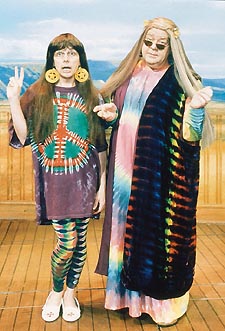 |
Two characters who are definitely faring better than diminutive deletions are Star Bird-Feather and Amber Wind-Chime. Sears as Star and Williams as Amber are Tuna’s two long-lost, new-age hippies, returned for the school reunion.
”They’ve turned out to be really great characters,” Sears says of Star and Amber. ”They dated back to our San Antonio days in the ’70s. We were both kind of hippie-esque. We had good friends who were very hippie. The part I play, Star, is based on a gal we both knew and loved dearly. We knew these people, we sure did.”
In the mix of all the Tuna characters, Sears and Williams say there is satire to skewer all sorts of people. They emphasize, however, that none of the satire is malicious. After all, Sears was born in Bartlesville, Oklahoma, while Williams grew up in Crosbytown, Texas, neither of which is too far from Tuna.
”When we wrote these plays, we wrote them from the heart and to get the laughs, but we didn’t know they would be universal,” says Sears. ”The conservatives love our show. They come to our show constantly. Maybe it’s because there are some undeniable truths involved in our writings. Those truths are done through laughs, and laughter is universal.”
Noting that universality, Williams emphasizes how their Tuna satire may be more patriotic at its heart than it seems on its surface.
”We both have a great affection for our country, and I think a considerable concern about the rising wave of intolerance,” says Williams. ”We’ve always taken that on with our characters. We hope that we reach some people with [Tuna] that you wouldn’t normally reach, and make people think about intolerance, and think about how they foist their religious beliefs on others.
”I’m really appalled. I mean, I go to church every Sunday that I can in Austin, Texas — a Methodist church, with my partner and son. And I resent the hell out of hearing these congressmen stand up on the floor of the House of Representatives and sanctimoniously proclaim that Democrats are anti-Christian. It really appalls me. Our work is meant to show our love for our country, and hold a mirror up to it. Hopefully, we do that and make people laugh at the same time. If you can make them laugh and make them think, then I think we’re doing our job.”
In the little down time Sears and Williams manage for themselves, they do live out versions of the American Dream. From their small-town beginnings, the two now call Austin home. Sears owns a summer stock theater company in Cody, Wyoming, and he wrote the Cherokee Nation’s Trail of Tears drama, which is performed annually. Meanwhile, Williams, with his partner, is raising the son he adopted recently from China, passing the torch to America’s next generation.
”It’s been marvelous,” Williams says of the new addition to his family. “He’s pretty theatrical. He sees the poster for Red, White & Tuna, and we’ve got Pearl and Vera there. Vera’s wearing that Statue of Liberty garb. So every time my son sees the Statue of Liberty, he points and says, ‘Papa.’ He thinks I’m the Statue of Liberty.”
Advertisement
|
Between laughs, Sears says that if Williams’s son sees him as the Statue of Liberty, it’s certainly his own fault. ”It’s only fitting,” he insists. ”Years ago, back in the ’70s, we went to a wild party in San Antonio, on New Year’s. I dressed as the American eagle. We had another guy dressed as Elvis. We had a Ku Klux Klansman with a burning cross. And Jaston dressed as the Statue of Liberty, with a copy of Jaws, holding a dildo. And real pregnant. We had a whole American theme.”
”That’s come home to haunt us,” says Williams. “We’ve always been satiric in nature, even when they didn’t pay us.”
Considering the success of the Tuna trilogy, it’s likely these very American satires will carry on into the future, long after Sears and Williams — now in their mid 50s — are dead and buried. Should that be the case, Williams has a bit of advice for those not-yet-born actors who will step into Tuna’s 20-plus pairs of shoes.
”Don’t ham it up,” he advises. ”It’s not as hard as it looks. I would like to think that we captured a segment of society, and that people would remember to play them with affection, even if they disagree with them. I always take offense at satire that is condescending, that seems to come from a point of view of we’re telling you how crazy or how stupid these people are. We don’t approach it that way. We try to show human frailties. I don’t think people set out to be mean or bigoted.”
And considering the Bush family successes with White House runs, does Williams think future generations of Tuna players may also stage command performances at Bush White Houses?
”Hell, there isn’t much left in that gene pool,” Williams jokes, going heavy on his Texas twang. ”There’s no telling what is lurking back in there somewhere.”
Red, White and Tuna runs through July 10 at the Kennedy Center Eisenhower Theater. Tickets are $20 to $50. Call 202-467-4600 or visit www.kennedy-center.org.
Support Metro Weekly’s Journalism
These are challenging times for news organizations. And yet it’s crucial we stay active and provide vital resources and information to both our local readers and the world. So won’t you please take a moment and consider supporting Metro Weekly with a membership? For as little as $5 a month, you can help ensure Metro Weekly magazine and MetroWeekly.com remain free, viable resources as we provide the best, most diverse, culturally-resonant LGBTQ coverage in both the D.C. region and around the world. Memberships come with exclusive perks and discounts, your own personal digital delivery of each week’s magazine (and an archive), access to our Member's Lounge when it launches this fall, and exclusive members-only items like Metro Weekly Membership Mugs and Tote Bags! Check out all our membership levels here and please join us today!






